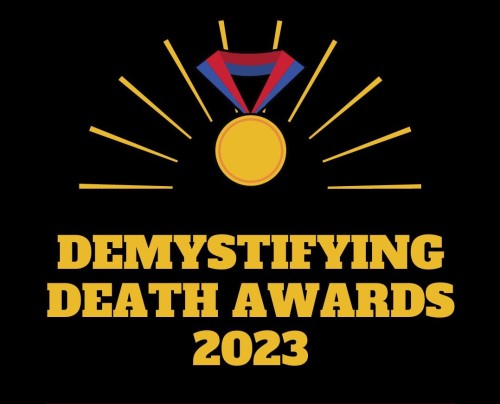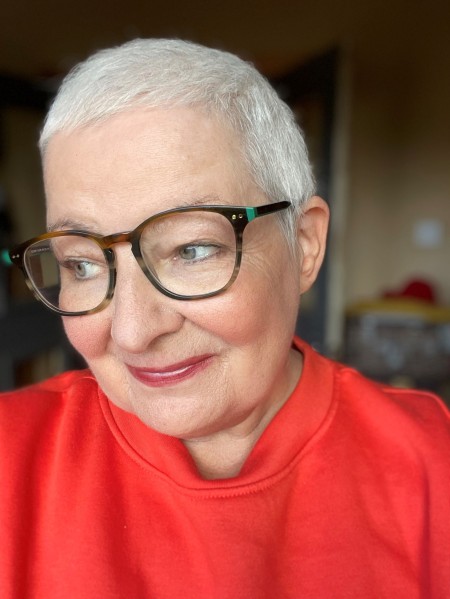Demystifying Death Awards 2023

We're delighted to announce the shortlist for this year's Demystifying Death Awards, recognising pioneering work that shines a light on death, dying and bereavement in Scotland.
The Awards celebrate those working to make Scotland a place where everyone can help when someone is caring, dying and grieving. Find out more about about the work of the shortlisted candidates below.
Increasing Understanding shortlist - Faith in Older People

Faith in Older People educates, encourages, and supports volunteers, health and social care workers, members of faith communities and other agencies to increase their understanding of spiritual care and issues around ageing. We do this through research, conferences, courses, on-line monthly seminars, a newsletter and working collaboratively. `
All the work we have undertaken with care home staff as well as faith communities highlight the difficulty people have in thinking about and perhaps understanding the importance of spiritual care in all our lives. Defining spirituality is always tricky. In this context, I have chosen the search forthat which:

“gives zest, energy, meaning and identity to the person’s life, in relation to other people and the wider world.”[1]
One of the good things which came out of the Pandemic was a greater appreciation of our spiritual lives and the comfort and resilience that it gives. For some people this encompasses faith and religion but in addition and for others it is about what matters to them in the widest sense – the outside world, music, relationships, and creativity. Underlying all attempts at defining spirituality is meaning and purpose and our sense of belonging.
Our current work includes a very welcome involvement in the development of the Scottish Government’s Spiritual Care Framework which we hope will raise the importance of including spiritual care in all health and social care and ensuring that all staff have a basic understanding of what it means for themselves as well as those for whom they care. FiOP contributed two scoping reviews highlighting the issues in university and FE college curriculums (Scoping reviews of spiritual care in the curriculum for nurses and health and social care staff (faithinolderpeople.org.uk).
Underpinning all our work is the spiritual dimension so we want to increase awareness of it through work on bereavement and we have just produced a collaborative newsletter with GLGDGG on this important issue. FiOP will also be facilitating the EASE course in the summer and these two strands of work are part of the collaborative nature of our work.

A recently published report ‘The Gift of Age’ ( The-gift-of-age.pdf (faithinolderpeople.org.uk) demonstrates the enormous contribution that older people make within their faith community and the support provided to other local initiatives. The work of faith communities often goes under the radar, but it can be seen in relation to supporting people who are lonely and isolated; those who are experiencing dementia or enduring mental health challenges.
In our discussions we have found that the language we use to talk about spirituality feels alien but when you begin to talk about what people do in providing care understanding develops. The need to listen attentively to hear what matters to someone and to see what lights them up – a walk in the rain; being read to; having their favourite music or simply the presence of someone who brings comfort. Its all about the individual; what makes their spirit rise and imbuing a sense of belonging.
Maureen
O’Neill
Director
Faith in Older People
www.faithinolderpeople.org.uk
Read about the other Demystifying Death Award nominees here: Demystifying Death Awards Blogs
[1] (Froggatt K and Moffitt L (1997) Spiritual needs and religious practice in dementia care. State of the Art in Dementia Care, London: Centre for Policy on Ageing (Ed. M. Marshall))
Promoting Planning Shortlist - The Daisy Chain by Pushing Up the Daisies

The members of our Daisy Chain are volunteers who have completed the online course and can give people guidance on their options when someone dies and share their local knowledge, for example of burial grounds, crematoria and funeral directors. They meet with people individually to do this and also hold ‘Round The Kitchen Table Sessions’. Someone who supports the work of Pushing Up the Daisies invites friends to come to their home for a few hours. The Daisy Chain member introduces what is possible during what we call the ‘Daisy Days’ - the time between a person’s death and their burial or cremation. The person hosting the session provides cake, and possibly also soup, to fuel conversation, and those attending go away with new ideas to discuss with their families and friends. If you would like to host a Round the Kitchen Table session, get in touch through our website and we will connect you to a local Daisy Chain member.

Daisy Chain members get together once a month at lunchtime for the Daisy Diner. Here they can catch up with other members and review a topic. This month the discussion was about the additional stresses on everyone involved when someone dies unexpectedly. Did you know that medical staff and police have particular procedures to follow when a death is unexpected? This can mean that relatives and friends are not able to see the person, or have access to the place where they died, for several days. Being aware of this may not make it any easier to deal with, but it may help people to be better prepared to look after themselves if it should happen.
Get in touch or find out more at Pushing Up the Daisies' website.
Photo: courtesy of Pushing Up the Daisies.
Read about the other Demystifying Death Award nominees here: Demystifying Death Awards Blogs
Promoting Planning Shortlist - ReSPECT

Building a Digital ReSPECT process for Scotland and transforming the emergency care experience.
The ReSPECT (Recommended Summary Plan for Emergency Care and Treatment) process is a UK wide initiative to support a person-centred and values-based approach to emergency care planning. The ReSPECT process was designed by Resuscitation Council UK to prompt and support intuitive future planning conversations about realistic emergency care preferences between an individual and their clinical team and to enable this conversation to evolve as care needs and preferences change.
Initially the ReSPECT process plan was designed as a paper document that was held by the patient. However the vision has always been for this information to be digitally held and shared across all health and care systems. Even the most person-centred and individualised future planning conversations will only work to transform care for that individual if the information can be recognised and accessed rapidly and safely in the midst of a health emergency or crisis. Crucial preferences and information about what really matters to the individual can make the world of difference to the care experience.
The ReSPECT process as one of the very first products to sit on the National Digital Platform. This challenge was taken on by the NES team who have worked closely with clinicians and stakeholders to ensure and maintain the integrity of that person-centred approach.

The National Digital Platform is part of the Scottish Government’s strategy to provide better access to health and care data: stored and shared through open standards including openEHR and FHIR. For clinical teams, ReSPECT’s user interface also follows the standard NHS design system for built-in usability and accessibility. Patient access to their own data (ReSPECT process and other data) is also in sight and is part of the Scottish Government’s Digital Front Door project.
This transformative work started 5 years ago in NHS Forth Valley as the first Board to embed the ReSPECT process, using the paper form, under the clinical leadership of Dr Lynsey Fielden. Currently the ReSPECT process is created and shared digitally across NHS Forth Valley, NHS Tayside and NHS Lanarkshire and other Health Boards due to start their digital rollout including Ayrshire and Arran, Dumfries and Galloway, Western Isles and Grampian. Together these Boards form the ReSPECT Collaborative, driving the uptake of ReSPECT and the digital application across Scotland.
Almost 1,000 people in Scotland have a ReSPECT plan – with this number growing daily. Key to this growth is the multi-disciplinary approach digital ReSPECT supports: health and care teams within primary and secondary care working together with community partners to ensure the outcome of a shared-decision making process, often including a family member or carer. Clinical teams have fed back that “ReSPECT gives patients a voice and a choice. I think that’s absolutely integral to what we’re doing that we have that voice” and patients have commented “this process helped with non-verbal communication … I was able to communicate my hopes and wishes for the future”.
ReSPECT data is currently shared with cornerstone systems such as Health Board’s Clinical Portals and GP/Docman system. Work is ongoing to share this data with the unscheduled care teams in Scottish Ambulance Service, Out of Hours GP and NHS 24 as part of the digital team’s ongoing workplan.
If Health Boards in Scotland want to use the ReSPECT process to transform emergency care planning and experience the digital part of that is ready to be embedded. Please contact Alistair.Ewing@nhs.scot if you would like more information or if you would like to join the Scottish ReSPECT Collaborative.
Read about the other Demystifying Death Award nominees here: Demystifying Death Awards Blogs
Promoting Planning Winner - NHS Greater Glasgow & Clyde Planning Your Care

Don’t let a global pandemic stop you from planning your future!
In April 2020 the newly formed Anticipatory Care Planning (ACP) Programme in NHS Greater Glasgow and Clyde were a little flummoxed – set against the pain and trauma of a global pandemic, how could we begin to convince over a million people that talking about the future (including the taboo topics of death and dying) was something which could be empowering, cathartic and maybe even a little fun (?!). As a team we knew of the tremendous benefit planning ahead could have, now we just had to persuade the world.
So how did we begin to break the taboo? Unfortunately, as with most things in life, there was no magic button. However here are my top 3 tips for success…

Number 1 – systems. We have been fortunate to have an incredible eHealth team who have created an accessible and user friendly system to record our ACP Summary, enabling us to record everything from views on hospital admission to who could look after the cat. Knowing what matters to individuals is crucial in enabling plans to be quickly developed whilst staying true to the principles of person-centred care. Therefore having all information to hand in a crisis allows the right decisions to be made.
Similar to a Key Information Summary (KIS) from the world of Primary Care, our summary helps to give services an understanding of the person in front of them. However it also has the advantage of being accessible and editable by teams from across Primary, Acute, Mental Health, and Community. This prevents people having to tell their stories over and over again, and ensure all services have an awareness of the information each other has collected whilst preventing duplication of conversation.
Number 2 - attitude. The ACP team may be small (a grand total of 2!) but we have enough passion for the whole of the Scotland! Our enthusiasm and determination has allowed us to power through a pandemic, creating training packs and resources at a whirlwind pace and ensuring over 1000 members of staff have received live online training, and 1500 have accessed our e-module. No mean feat whilst pandemic pressures stretched the capacity and resilience of frontline staff to their limit!
Once restrictions began to lift, we were straight out the door delivering sessions to students, work teams and the public to encourage them to start the conversation, and always with smiles on our face.
We are an approachable duo, always happy to engage with services and find solutions to best support them, whether that is bespoke training, streamlining data collection forms, creating leaflets for day to day practice or just being a reassuring voice at the end of the phone to provide encouragement and the occasional piece of IT advice. We are fully committed to supporting our colleagues who are out on the frontline having these tender but powerful conversations with the public.
And this brings us to number 3 – colleagues. Partnership working has always been a key part of our work, however we have been extremely fortunate to work with fantastic colleagues to drive forward the ACP agenda. From supportive Chief Officers, to amazing GPs, from technical geniuses in IT to the most caring and compassionate professionals having daily conversations with patients. Every single person has embraced their role, and played their part in making the system work.
So fast-forward 3 years, what have we achieved? Well not everyone in the Board has an ACP yet, but we’re headed in the right direction!
When the programme first began there were only 19 ACP Summaries recorded on our system, today we have over 3200 with numbers increasing daily. We also have a thriving community of ACP champions who help and encourage their colleagues to engage in these important conversations, and signpost them to support when needed. Alongside this, we organises multiple events throughout the year to encourage people to start conversations; from appointing Power of Attorney, deciding whether to donate your body to science or learning about the full range of holistic services hospices can provide, our aim is to create compassionate communities that support each other from cradle to grave, where nothing is left unsaid and everyone is confident that whatever may come, we have a guide to help us plan together.
Find out more on the NHSGGC Planning Your Care website and Twitter account.
Read about the other Demystifying Death Award nominees here: Demystifying Death Awards Blogs
Celebrity Champion Shortlist - Janey Godley

Janey Godley is a Scottish stand-up comedian, actress and writer from Glasgow. She won the Scots Language Awards Speaker of the Year Award in 2020, and in 2023 won the Spirit of Glasgow Comedy Award, chosen by Billy Connolly. She has published three books, and is well known in Scotland for her series of ‘Frank Gets the Door’ voiceovers shared on Twitter during the covid pandemic.
In November 2021, Janey announced via Twitter the cancellation of the last weekend of her tour, explaining that she had been diagnosed with ovarian cancer and was being treated in hospital. She had a full hysterectomy in January 2022 and
announced in June that she was cancer-free. On 13 December 2022, she announced that her cancer had returned and that she would need further chemotherapy.
The fact that all of the above is common knowledge via Janey’s Wikipedia page is illustrative of the openness with which she has shared (and continues to share) her cancer journey on Twitter. Through this, Janey has demonstrated that it is not taboo to talk about illness, cancer, or cancer treatment, providing some solace to others going through similar experiences.
By modelling an open approach, Godley has helped to increase awareness that cancer journeys can be unpredictable, and that people continue to work and live and achieve while living with serious incurable illness. She continues to share updates on her cancer journey on Twitter, and her reach extends far beyond her followers, with her story appearing for example in the Independent, the Daily Record and the Guardian.
Janey Godley is currently part way through her Not Dead Yet Tour.
Read about the other Demystifying Death Award nominees here: Demystifying Death Awards Blogs
